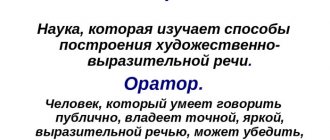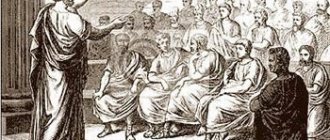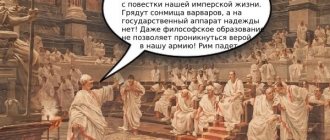It is important for every person to be able to communicate, since such a skill is a good assistant in many life situations. Almost all successes in school, work, and personal life are built on communication skills. If the information is presented by the speaker concisely and structured, then it will reach the listeners in the best possible way. The science that studies all the details of oratory is called rhetoric. It is thanks to her that you can make your speech clear and convincing. Rhetoric – what is it? Science or academic discipline?
In Dahl's dictionary
and. Greek rhetoric, the science of eloquence, eloquence. Rhetor, -rka, teacher of eloquence; an eloquent, eloquent person, an eloquent speaker, an artificially elegant writer. Rhetorical, related to rhetoric and rhetoric. Rhetorical, characteristic of rhetoricians. Rhetorical tropes, figures, artificial decorations of speech, given in the rules. To rhetoric, rhetorically, speak or write eloquently, eloquently, flowerily, skillfully and artificially, diligently imitate elegant writers, and therefore speak pompously and coldly. Rhetorism, rhetoric, action according to the verb. There is no soul in his speeches, it is just rote rhetoric. Rhetorical, in which there is a lot of rhetoric. Rhetoric, yes cloying.
What is teaching?
What does the word "rhetoric" mean? Translated from Greek, the word rhetoric looks like “rhetorike” and means “oratory.” Initially, this definition implied the ability to speak beautifully and express one’s thoughts in front of other people.
Over time, the concept of rhetoric changed several times, which was influenced by changing periods of people’s cultural development. Therefore, this science, from antiquity to the present time, was perceived differently.
It was founded by the sophists, who said that rhetoric is a discipline that can teach a speaker to prove his position, manipulate and dominate discussions. In modern times, the basis of such a science is harmonizing speech, the search for truth, and stimulation of thought.
Now the word rhetoric is understood as a discipline that allows you to study methods of forming speech, characterized by expediency, harmony, and the ability to influence. In this regard, the subject of rhetoric acts as a mental-speech action. Rhetoric combines the teachings of philosophy, sociology, and psychology, which helps to achieve effective verbal interaction with any public.
Thus, modern rhetoric is considered from three sides:
- This is a science that examines the art of speech, which has specific standards for public speaking in front of people, allowing one to achieve a good result when influencing listeners.
- This is the highest level of skill in delivering a speech in front of an audience, mastery of words at a professional level and excellent oratory.
- An academic discipline that helps students instill the rules of public speaking.
Thus, general rhetoric studies the rules for constructing expedient and persuasive speech, which helps make the speech vivid and memorable.
In the Encyclopedia Dictionary
(Greek rhetorike), 1) the science of oratory and, more broadly, of artistic prose in general. It consisted of 5 parts: finding material, arrangement, verbal expression (the teaching of 3 styles: high, medium and low and 3 means of elevating style: selection of words, combination of words and stylistic figures), memorization and pronunciation. Rhetoric was developed in antiquity (Cicero, Quintilian), developed in the Middle Ages and in modern times (in Russia M.V. Lomonosov). In the 19th century the doctrine of verbal expression merged into poetics and became part of the theory of literature under the name of stylistics. All R. 20th century the broad (general literary, linguistic and even philosophical) significance of tereffective speech communication is being revived. 2) Musical rhetoric is a musical theoretical doctrine of the Baroque era, associated with the view of music as a direct analogy of oratorical and poetic speech. Included the same parts as literary rhetoric; their content was expressed in a system of specific musical techniques (see Art. Figure).
Origin and essence of rhetoric
What is rhetoric? This is the ability to convince the public with the help of words, to clearly and convincingly convey your thoughts.
The term "rhetoric" comes from the Greek language. The Russian language has its own equivalent to this concept. Skillful use of words, the ability to select compelling arguments and vivid examples is called “eloquence.”
Despite the prevalence of the term, there is no single definition for it. Is rhetoric a science, a skill, a speaking practice, or a way to conduct a discussion? The answer is worth looking for in its origin.
How did rhetoric come about? Historians associate its origins with the victory of democracy in Ancient Greece, namely with the introduction of written law. In 621 BC, a reform was carried out in Athens, according to which the laws were set out on tables. Anyone could go to court, indicating the article of the law that was violated by the offender. The offender was usually sentenced to death, so there was a need to clearly and accurately argue his position.
Such a system required certain skills from citizens:
- knowledge of literacy, ability to read laws;
- ability to logically prove an accusation;
- ability to refute an accusation.
The Greeks had to learn eloquence, wit, criticism, the ability to argue and persuade. Over thousands of years, the use of rhetoric has changed significantly, but the essence remains the same.
"Cicero Unmasks Catiline" (1888): Wikipedia/Cesare Maccari
Knowledge about the origin of rhetoric allows us to find an answer to another question. Is rhetoric a science or an art? For the ancient Greeks, the following were important in public speech:
- thoughtful idea;
- sequence of presentation of the material;
- prepared arguments and examples;
- references to authoritative sources, in particular to written law;
- beautiful literary speech.
Based on this, it is logical to call rhetoric a science. However, even Aristotle himself considered such a definition incomplete. In his treatise “Rhetoric,” the philosopher wrote about art, which is not limited to proven knowledge. Sometimes unexpected, irrational thoughts that appeal to the senses and creativity are more persuasive.
In Ancient Greece, extremely harsh, “draconian” laws reigned. It is not surprising that they were regularly violated. To save lives, it was not enough for people to refer to the law and appeal to logic. They found other ways to convince justice of their innocence.
Business coach Elmira Zhaishaeva adds that the ability to persuade is not only verified, literary correct speech, but also gestures, voice acting, and manners. This means that rhetoric is a kind of art.
To summarize, it is worth saying that the theory of rhetoric cannot exist without practice, just as science cannot exist without art.
Rhetoric: Unsplash
More, even more information!
Of course, neither today nor five hundred years ago everyone was destined to become a commander or statesman. But the role of eloquence in the past was significantly higher than it is now. Why? It’s very simple: we, people of the 21st century, are fed up with information. We watch films, listen to news on the radio, read feeds from information sites. Every minute, gigabytes of photographs, articles, messages, and music tracks are dumped on us. Many of us encounter verbal communication only at a school desk or in a university lecture hall. In short, we can obtain a huge amount of information without resorting to face-to-face communication. At the same time, the quality of the text itself fades into the background - in many cases the text is replaced by a video, photograph, or infographic.
And a resident of a medieval city or Greek polis sometimes had no other opportunity to find out the latest news than to listen to an orator or herald. This man had no photographs or videos at his disposal; he could only rely on his eloquence. Let us remember that there were few literate people then, so even written sources of information could not always fully fulfill their functions.
“By reading authors who write well, you learn to speak well” (Voltaire)
Lawyers, teachers, religious figures, politicians learned to speak correctly and convincingly... By the way, it was in the political struggle that the ability to defend one’s point of view and attract like-minded people never lost relevance: for example, many researchers are convinced that during the Civil War in Russia, victory remained with “ “red”, not least thanks to competent, very visual and superbly organized campaigning.
“But excuse me,” you can say, “now is no longer the Middle Ages and, fortunately, not the times of the Civil War! Moreover, many politicians and public figures have long preferred not to speak from the podium, but to use the capabilities of the World Wide Web for propaganda!” This is partly true. But…
Laws of word art
Rhetoric at any time had its ultimate goal - to influence listeners. A special role in achieving this is played by expressive speech, as well as visual and expressive means.
Scientists divide this science into two types - general and particular. The subject of general rhetoric includes general methods of behavior when pronouncing speech and the practical possibilities of their application in order to make speech effective.
This variety includes the following sections:
- rhetorical canon;
- speaking in front of an audience;
- rules on how to argue;
- conversation norms;
- teachings about everyday communication;
- communication between different nations.
By studying these sections, the speaker gains knowledge about the main features of speech use, which are the basis for every master of words.
General rhetoric studies ways to achieve mutual understanding between the speaker and the audience. For this purpose the following laws were developed:
- The law of harmonizing dialogue. The speaker must awaken the feelings and thoughts of the listeners, turning the monologue into a dialogue. It is possible to build harmonious communication only through dialogue between all people participating in the discussion. The essence of this rule is more accurately revealed by the following laws.
- The law of listener orientation and advancement. The person at whom the orator's influence is directed should have the feeling as if he, together with the speaker, is moving towards the intended goal. To achieve this effect, the speaker must use words in speech that determine the order of events, connect sentences and summarize expressions.
- The law of emotional speech. A person speaking in front of an audience must himself experience the feelings that he is trying to evoke in the audience, and also be able to convey them through speech.
- Law of pleasure. It implies the ability to present speech in such a way that it brings pleasure to listeners. This effect is easy to achieve if the speech is expressive and rich.
A particular type of rhetoric is based on a general type and involves the specific use of general provisions in certain areas of life. Thus, science studies what rules of speech pronunciation and behavior a speaker needs to apply depending on the situation.
There are a lot of private rhetorics, but they all fall into two main groups:
- Homiletics.
- Oratory.
The first group implies the speaker’s ability to repeatedly influence the audience. This includes church and academic types of eloquence. In modern rhetoric, this group includes propaganda that is carried out in the media.
Thus, with academic eloquence, a speaker, giving several lectures, should not speak anew each time about the purposes of their conduct, their necessity, and so on. It is enough for him to talk about this in the first lecture, and in all the rest the general task will be expanded through the study of a new topic.
Oratory is not capable of influencing people many times over. In this regard, the speaker must be able to correctly conclude each speech. This group includes judicial, everyday, socio-political and other types of eloquence.
Currently, oratory has grown quite widely, so a specific type of rhetoric has already begun to be divided into its own subspecies. For example, administrative, diplomatic, parliamentary and other rhetoric were distinguished from socio-political eloquence.
What if...
Let's start with an argument: why in our time does it seem to many that almost no one needs the ability to competently, beautifully and clearly express their thoughts, communicate with an audience, and convince listeners?
We partly answered this question a little higher: modern means of communication do part of the work for us. Alas, communication sometimes comes down to exchanging short messages - or even emoticons.
Allegory of rhetoric (XVI century). Engraving by Etienne Delon
But in ancient times, during the Middle Ages (whatever, even some fifty years ago!) the absence of electronic means of communication and various messengers required the ability to speak in public, clearly formulate one’s views, and present them competently. It’s not just that, through centuries and even millennia, samples of speeches that were once made by politicians, generals, and religious leaders have reached us...
One can endlessly wonder whether Julius Caesar would have become the ruler of the Roman Empire if he had not been able to find a common language with both high-born members of the Senate and representatives of the plebeians? Would the Italian monk Girolamo Savonarola have been able to practically lead the entire spiritual life of Florence and reform church life for many years, if not for his brilliant oratorical abilities? Who knows how the Battle of Poltava would have ended if Peter I had not found the right words to inspire the soldiers before the start of the battle? Examples can be given endlessly...
“Poetic creativity is a play of feeling, guided by reason; eloquence is the work of reason, enlivened by feeling” (Immanuel Kant)
Development of rhetoric in Russia
Rhetoric in Russia arose on the basis of Roman science. Unfortunately, it was not always in such demand. Over time, when political and social regimes changed, the need for it was perceived differently.
Development of Russian rhetoric in stages:
- Ancient Rus' (XII–XVII centuries). During this period, the term “rhetoric” and educational books on it did not yet exist. But some of its rules were already applied. People at that time called the ethics of speech eloquence, piety or rhetoric. Teaching the art of the word was carried out on the basis of liturgical texts created by preachers. For example, one of these collections is “The Bee,” written in the 13th century.
- First half of the 17th century. During this period, a characteristic event was that the first Russian textbook was published, revealing the basics of rhetoric.
- The end of the 17th – the beginning and middle of the 18th century. At this stage, the book “Rhetoric”, written by Mikhail Usachev, was published. Many works were also created, such as “Old Believer Rhetoric”, works “Poetics”, “Ethics”, several lectures on the rhetorical art of Feofan Prokopovich.
- XVIII century. At this time, the formation of rhetoric as a Russian science took place, to which Mikhail Vasilyevich Lomonosov made a huge contribution. He wrote several works dedicated to it, of which the book “Rhetoric” became the basis for the development of this science.
- Beginning and mid-19th century. This period is characterized by the fact that there was a rhetorical boom in the country. Famous authors published a large number of textbooks. These include the works of I.S. Rizhsky, N.F. Koshansky, A.F. Merzlyakova, A.I. Galich, K.P. Zelensky, M.M. Speransky.
However, starting from the second half of the century, this science begins to actively supplant literature. Soviet people studied stylistics, linguistics, speech culture, and criticized rhetoric.
Internal classification
Rhetorical science is divided into two main types - general and specific.
They are understood as follows:
- General rhetoric is a science that studies universal paradigms (what is this?) and the rules for creating high-quality (effective and beautiful / only effective) speech. It does not affect specific areas.
- Private rhetoric is more applied in nature. It is built on separate types of communication (how is that?) and depends on the sphere of life activity.
How many private rhetorics ? Hard to say. As many as there are areas in which a person must communicate and communicate.
We can name the most voluminous ones:
- political,
- judicial,
- solemn,
- theological,
- academic,
- business,
- journalistic.
The first four are called traditional; they were identified a long time ago. The remaining three are acquisitions of recent centuries.
There is another classification . So, rhetoric happens:
- Theoretical. Explores the rules of creating good speech.
- Applied. Uses the highlighted rules in practice.
- Thematic. Studies the fields of different types of literature, united by one topic. As an example, the rhetoric of the presidential elections.
Speaking skills: Who needs it?
Despite the fact that we devote less and less time to personal communication, and we trust gadgets more and more, we can name many situations when eloquence skills are necessary.
The simplest example: you need to give a presentation to business partners. Yes, of course, sometimes no presentations are required and when concluding deals you can get by with an email. But you can probably remember a couple of situations when, for example, the need to publicly talk about your company or products caused an acute attack of panic among employees - for the simple reason that they were not confident in their rhetorical skills. Or when an insecure, boring, sluggish presentation by a company representative discouraged potential clients from doing business with her...
“Speech should flow and develop from knowledge of the subject. If the speaker has not studied it, then all eloquence is a vain, childish effort" (Cicero)
Surely, if you remember your student years, you will be able to name the names of teachers whose lectures you listened to with enthusiasm, and even notorious lazy ones. Simply because the professor or associate professor brilliantly mastered the art of words, “saw” the audience, and knew how to contact it (yes, this is a necessary skill, and we will definitely talk about it too!). And, unfortunately, they remain in the memory of many of us. no, not lectures, but memories of how during these lectures we painfully tried not to fall asleep and remember at least something. And at this time the lecturer, with his eyes downcast, muttered indistinctly, moved from the fifth to the tenth and with all his appearance expressed disgust at what was happening. Yes, many educational institutions already have video recordings of lectures in their arsenal, and it is not always necessary to attend a “live” lesson. But audio or video lectures can also be both successful and not so successful.
Guy Julius Caesar in his youth studied the art of eloquence, but, according to the testimony of many ancient historians, he did not complete the course of study. He decided that where he lacked rhetorical abilities, his legions would say everything for him. However, the literary heritage of the Roman ruler suggests that he was undoubtedly a talented speaker and writer
Perhaps you have come up with another argument: “But many have graduated long ago and, for example, are working remotely! Thanks to modern technologies, you can provide for yourself without leaving home at all! Why should I care about eloquence and the ability to properly structure the communication process?” Yes, but not so. Remember how many times you were indignant, for example, at the tongue-tied instructions for household appliances, how many times you couldn’t decide on a summer vacation destination because of a clumsily drawn up tour description, how many times you couldn’t get clear and logical instructions from your manager... But all this has a direct impact attitude to the art of rhetoric! After all, even if the text is not intended to be spoken publicly, no one has canceled the need to compose it competently and logically.
And in ordinary everyday communication, a person who can express his thoughts beautifully, captivatingly and clearly is much more pleasant than a gloomy type who is unable to connect two words. (We will still proceed from the fact that we do not spend our entire lives within four walls and from time to time “go out into the world.”) Even the ancient Greek sage Aristotle (by the way, who did a lot for the development of ancient rhetoric) said: “Man... is social animal." As long as human society exists on Earth, we will need communication skills. Honestly, this law has been true since the time of Aristotle!
Well, did we manage to convince you?
A matter of national importance
Peter I demanded from those close to him not only precision and clarity of reports, but also mastery of the subject. Just look at his decree of 1703: “I instruct the senators at assemblies and in the presence of gentlemen to speak only in words, and not in writing, so that everyone’s stupidity is visible to everyone!”








